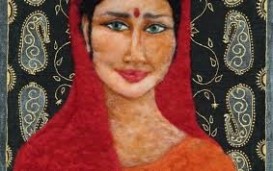As of April 15,2014, India now recognizes transgender people as
individuals that deserve full rights and recognition under the law. The
momentous court ruling views transgender people as a third neutral
gender, neither male nor female, and alters government documents to give
the option of identifying as a third gender. Article 15 of India’s
Constitution states antidiscrimination rights on the basis of caste,
race, religion, and sex, but discrimination was still prevalent among
the Hijras,
which have a long history in India. When handing down the court’s
ruling, Justice K.S. Radhakrishnan proclaimed, “Transgenders are
citizens of this country … and recognition as a third gender is not a
social or medical issue but a human rights issue.” 

The Hijras had a long and storied history in India. There are stories
about them in the Mahabharata and the Ramayana. They were normally
devotees of the mother goddess Bahuchara Mata or Shiva, identifying with
these gods’ gender ambiguity in their various incarnations. During
British control over India, the British Raj tried to eliminate the
Hijras, believing they were indecent and giving legal sanction to the
discrimination that continues today. The over 3 million Hijras are easy
targets for discrimination, as their culture promotes unusually bright
colored attire and performing certain religious and cultural activities.
Often these activities make them extremely visible in communities that
contain hostile elements, leaving the Hijras vulnerable to abuse and
violence.
Third gender people are recognized and a vital part of numerous
cultures throughout the world. Outside the Indian subcontinent,
Amerindian populations in North and South American recognize third
genders, such as the Zuñi male-bodied Łamana, the Lakota male-bodied
winkte and the Mohave male-bodied alyhaa and female-bodied hwamee. The
Zapotec’s In Mexico include a third gender, the Muxe. With the court
ruling, India joins several South Asian countries to give limited (but
important none-the-less) recognition to a third gender, including
Bangladesh, Nepal, and Pakistan. The first western nation to give
limited recognition of third gender identity was Germany, when last year
they allowed parents to mark “indeterminate” on birth certificates. The
India court, by declaring that “transgender is generally described as
an umbrella term for persons whose gender identity, gender expression or
behavior does not conform to their biological sex,” has taken a small
but vital step in the recognition of common human rights. Or as Anitha
Shenoy, one lawyer who helped argue the case, more elegantly states it,
“This is an extremely liberal and progressive decision that takes into
consideration the ground realities for transgender people in India…The
court says your identity will be based not on your biology but on what
you choose to be.”
No comments:
Post a Comment